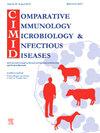Assessment of SARS-CoV-2 exposure in exotic pets in Spain
IF 2
3区 农林科学
Q4 IMMUNOLOGY
Comparative Immunology Microbiology and Infectious Diseases
Pub Date : 2025-01-01
DOI:10.1016/j.cimid.2024.102289
引用次数: 0
Abstract
Evidence of SARS-CoV-2 infections in different animal species raises concerns about the potential for animal reservoirs and transmission to humans. Here, we evaluate the exposure of exotic pet species to this virus throughout the early years of the pandemic (2020 – 2022) in southern Spain. A total of 180 exotic pets (126 domestic rabbits, 31 ferrets, and 23 rodents) were analyzed for antibodies against SARS-CoV-2 using two different ELISAs. ELISA-positive sera were subsequently tested for specific neutralizing antibodies (nAbs) using the virus neutralization test (VNT). Only one brown rat (Rattus norvegicus), representing 0.6 % of the total, tested positive by ELISA, yet showed negative result for SARS-CoV-2 nAbs by VNT. Our results suggest a very limited risk of SARS-CoV-2 transmission among humans and sympatric exotic pet species in the study region. However, the virus's potential for interspecies transmission emphasizes the need for ongoing surveillance, especially in settings with frequent human-animal interactions, to avoid potential virus evolution, the emergence of new animal reservoirs, and spillover events.
西班牙外来宠物SARS-CoV-2暴露评估
不同动物物种中SARS-CoV-2感染的证据引起了人们对动物宿主和传播给人类的可能性的担忧。在这里,我们评估了西班牙南部在大流行初期(2020 - 2022年)外来宠物物种对该病毒的暴露情况。使用两种不同的elisa对180只外来宠物(126只家兔、31只雪貂和23只啮齿动物)进行了SARS-CoV-2抗体分析。随后使用病毒中和试验(VNT)检测elisa阳性血清的特异性中和抗体(nab)。只有1只褐鼠(Rattus norvegicus) ELISA阳性,占总数的0.6% %,而VNT检测SARS-CoV-2抗体阴性。我们的结果表明,在研究区域,SARS-CoV-2在人类和同域外来宠物之间传播的风险非常有限。然而,由于该病毒有可能发生种间传播,因此需要持续监测,特别是在人与动物频繁相互作用的环境中,以避免潜在的病毒进化、新的动物宿主的出现和溢出事件。
本文章由计算机程序翻译,如有差异,请以英文原文为准。
求助全文
约1分钟内获得全文
求助全文
来源期刊
CiteScore
4.60
自引率
0.00%
发文量
102
审稿时长
40 days
期刊介绍:
Comparative Immunology, Microbiology & Infectious Diseases aims to respond to the concept of "One Medicine" and to provide a venue for scientific exchange. Based on the concept of "Comparative Medicine" interdisciplinary cooperation between specialists in human and animal medicine is of mutual interest and benefit. Therefore, there is need to combine the respective interest of physicians, veterinarians and other health professionals for comparative studies relevant to either human or animal medicine .
The journal is open to subjects of common interest related to the immunology, immunopathology, microbiology, parasitology and epidemiology of human and animal infectious diseases, especially zoonotic infections, and animal models of human infectious diseases. The role of environmental factors in disease emergence is emphasized. CIMID is mainly focusing on applied veterinary and human medicine rather than on fundamental experimental research.

 求助内容:
求助内容: 应助结果提醒方式:
应助结果提醒方式:


